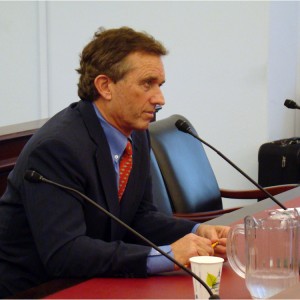Ned Breslin: Keep it Flowing — Rethinking Community Water Management
A subtle but important trend in the water sector is only now starting to emerge in developing nations–a shift toward private operators and mobile mechanics is taking place throughout the world, challenging the sector norm in which each community has traditionally been encouraged to operate its own small water utility. There are numerous examples of this, all of which indicate steps in the evolution of community water management.
Private Operator: Jean Marie Vicenny, Rwanda
Jean Marie Vicenny needs water to flow in rural Rwanda or he is out of a job. He is a private water operator responsible for a growing water system in the Kuyonza District, and his business has created 16 full-time jobs in a region with high unemployment, in addition to the 196 kiosk operators who get a small stipend and a set amount of free water. Jean Marie and his employees do well when the people they serve get water.
The system is spring fed, combining household connections and public kiosks scattered over approximately 15 kilometers of Rwanda. Families have options on their levels of service—either public or a yard tap—so nobody goes without. Households are increasingly selecting yard taps, which is encouraging because people should have water as close to their homes as possible. And everyone is serviced, even the ultra poor and vulnerable who are awarded lifeline tariffs that are free or significantly reduced.
If people don’t get water, Jean Marie, his staff, and the kiosk operators do not get paid–so they fix problems quickly, and water flows.
Mobile Mechanic: Dipak Hoozlad, India
Dipak Hoozlad–an entrepreneur from the Sundarban Islands of West Bengal, India–is a Jalabandhu mobile mechanic who roams the countryside, maintaining water systems for a fee. The Jalabandhu, which is Bengali for “Friends of Water,” were formed by Water For People’s local partners such as the Sundarban Social Development Centre and Sabuj Sangha, local NGOs whose work is outstanding and who think creatively about new ways to empower communities to address their development challenges.
Communities retain responsibility for financial management and tariff collection, but they have outsourced system operation and maintenance (O&M) that is otherwise too difficult to sustain at a village level. This is where Dipak, a mobile contractor, comes in.
Dipak’s schedule includes the monthly servicing of hand pumps, as well as the occasional emergency visit to the village when a hand pump breaks. The community would much rather pay him for this service than have to manage a village water committee that is repsonsible for all O&M requirements and is forced to worry about, among other things:
- hosting community meetings;
- scrambling for spares whenever a pump breaks;
- managing a local plumber who will fix the water system when it breaks;
- dealing with committee turnover that is inevitable and hard to manage at a village level.
They want their water flowing, and they will pay for it.
When I met Dipak for the first time two years ago, he was responsible for multiple handpumps in eight communities and was working part-time as a teacher, which is irregular work. Now, he has expanded his network to a total of 87 communities, and Dipak thinks he can devote himself full time to water supply O&M if he can secure the contracts of about 150 communities. The exponential expansion he’s already experienced is, in part, because he outcompetes other Jalabandhu–suggesting that communities want great service and will change mechanics if not completely satisfied with the quality of work performed.
Dipak understands that his success is only ensured if he keeps the water flowing.
Organizational Involvement
Hardly anyone does development work in the Central African Republic because it is too hard, too isolated, and too far off the map of development priorities. Distances between communities are vast, and roads are horrible, even on a good day. Community access to hand pump spares and technical support are limited, so when problems emerge, it is difficult for communities to address them and keep their water flowing.
In response, Integrated Community Development International (ICDI), a faith-based, non-profit organization, developed their own mobile mechanic program—basic O&M and repairs are done quarterly by maintenance teams that move through the country’s rugged terrain. Mechanics bring hand pump spares and knowledge, communities pay for this service, and water flows. Jobs are created.
When the program started, in 2005, there was one maintenance team supporting approximately 250 water points. Today there are three teams supporting 850 wells, with a further expansion underway that will require another team for and bring the total to well over 1,000 communities.
We are seeing Water User Associations (WUA) in Blantyre, Malawi expanding water services and keeping water flowing, while creating jobs in the process. Inter Aide, a French-based NGO that implements development programs to support underprivileged families, has developed an interesting program in Malawi that is based on some of these same principles. The Church of Central Africa, Presbyterian (CCAP) is testing some options in the far north of Malawi, and WaterAid is rolling out similar programs in Uganda and India. The IRC International Water and Sanitation Centre is promoting this type of work in Ghana and Uganda.
Striking a Balance
Private operators and mobile mechanics are far from perfect. Some entrepreneurs require subsidies as they get established, but some market-based alternatives are not very good at keeping water flowing. Subsidies should thus be viewed not so much as a flaw, but as an important fact to highlight in the honest debate of how best to support community water development.
How governments around the world respond to market-based solutions remains unclear, although stories like Jean Marie from Rwanda offer great hope. Although the sustainability of these promising alternatives remains questionable, it seems as though they have been carefully crafted by reflecting upon the limitations of traditional community-based management models.
Communities worldwide struggle accessing spare parts for their water systems, battle managing their systems in a void, and falter when encountering technical problems that are beyond their ability to address. The expectations surrounding traditional community-based management have always outstripped the reality on the ground.
Thankfully, some thoughtful countries and organizations are using an honest assessment of the troubles encountered in the field and are starting to rethink their approach to capacity building around the management of improved water supplies. They are striking balances that focus on local financial control and decision making, while creating the conditions for communities to seek operation and maintenance help outside of the community, from mobile mechanics like Dipak that charge a fee.
The important thing is that the water continues to flow.
Ned Breslin
Follow Ned Breslin on Twitter.











Ned,
Great blog. I would like to add that although ICDI does not have all the answers and we are not doing everything exactly right we are doing two things that I think are very important for the long haul….
1) Everything we do we train the Central Africans to do. I have NO expat working in CAR on a continuing basis…we come…train and go. Each of our programs in WASH are there to help the village but the Central African is much better at helping his village than I ever will be…I will always be the “white boy” and I have been here over 50 years. (Okay so the white old man.)
2) There must be buy-in by any community. If there is not they see it as your well, your latrine, your idea etc etc. If they see it, build it, pay for it and make it work then even when we are long gone the improvement lasts and keeps working.
Actually with these two points you could actually consider each of these well pumps as an MED…are all 850 working? Nope…tomorrow I am going to see a community where we locked up the well pump for a while because they were not “owning” it or paying for it. Were they upset…Oh yea….will it change? I hope so.
It is a PROCESS…it will not happen overnight but we have to start now.
thanks Ned.
Jim
Ned:
For the past couple of years we have utilized a market based system, using microcredit loans, to spur an entrepreneurial approach to selling, distributing, and servicing portable water filters in the northern-rural region of the Dominican Republic. The system relied on having an NGO, heavily invested and Dominican run, in place. Community health promoters were engaged to help sell and service the water filters and they would get a small percentage of sales. This was run out of an NGO that had a book keeper and technical guy to assemble and deliver the filters. The NGO developed the microcredit approach and hired the technical guy using money from a grant that we got from the National Collegiate Innovators and Inventors Alliance (NCIIA). The program has been self-sustaining and money put into the program has been used to finance the sale and delivery of more than 1,000 portable water filters. The problem was the world wide recession and turnover. This NGO has had to lay off the technical guy and the book keeper moved on. The program is still working but relies on this well integrated NGO on the ground. The bottom line is that market systems have worked but not without the aid of a safety net. I agree that the mobile, entrepreneur is a good model for delivery of water and we plan on using it in a haitian batey soon. However, many communities still need the leadership and safety net that “market” savy NGOs can bring to the table when helping communities get water through business people.
I agree with Jim Hocking on his post!
By the way, I heard you talk on “Market Place”. Nice story. Roger.